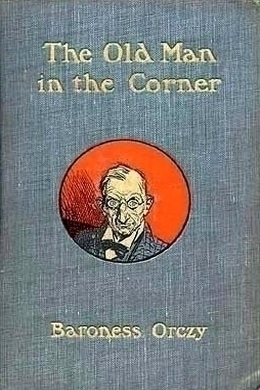
-
EPUB 487 KB
-
Kindle 464 KB
-
Support epubBooks by making a small $2.99 PayPal donation purchase.
Description
A nameless old man sits in the corner of a cozy London tea shop, and without leaving his seat, solves baffling crimes reported to him by an admiring lady journalist. Using only methods of pure deduction, the eccentric, self-assured sleuth unravels the mysteries behind a wide range of criminal acts — from gruesome murders (The Lisson Grove Mystery) and daring thefts (The Affair at the Novelty Theatre) to brilliant deceptions (The Liverpool Mystery) and deadly blackmail schemes (The Murder of Miss Pebmarsh). Set in the fog-shrouded streets of London, where gas lamps flicker in the gloom and details of lurid crimes splash across the pages of the daily papers, these ingenious, well-crafted stories by the author of The Scarlet Pimpernel are among the first and great collections of detective fiction. They will delight devotees of Sherlock Holmes and other mystery-loving fans.
279 pages with a reading time of ~4.25 hours (69805 words), and first published in 1908. This DRM-Free edition published by epubBooks, 2014.
Community Reviews
There are currently no other reviews for this book.
Excerpt
The man in the corner pushed aside his glass, and leant across the table.
“Mysteries!” he commented. “There is no such thing as a mystery in connection with any crime, provided intelligence is brought to bear upon its investigation.”
Very much astonished Polly Burton looked over the top of her newspaper, and fixed a pair of very severe, coldly inquiring brown eyes upon him.
She had disapproved of the man from the instant when he shuffled across the shop and sat down opposite to her, at the same marble-topped table which already held her large coffee (3d.), her roll and butter (2d.), and plate of tongue (6d.).
Now this particular corner, this very same table, that special view of the magnificent marble hall–known as the Norfolk Street branch of the Aërated Bread Company’s depôts–were Polly’s own corner, table, and view. Here she had partaken of eleven pennyworth of luncheon and one pennyworth of daily information ever since that glorious never-to-be-forgotten day when she was enrolled on the staff of the Evening Observer (we’ll call it that, if you please), and became a member of that illustrious and world-famed organization known as the British Press.
She was a personality, was Miss Burton of the Evening Observer. Her cards were printed thus:
She had interviewed Miss Ellen Terry and the Bishop of Madagascar, Mr. Seymour Hicks and the Chief Commissioner of Police. She had been present at the last Marlborough House garden party–in the cloak-room, that is to say, where she caught sight of Lady Thingummy’s hat, Miss What-you-may-call’s sunshade, and of various other things modistical or fashionable, all of which were duly described under the heading “Royalty and Dress” in the early afternoon edition of the Evening Observer.
(The article itself is signed M.J.B., and is to be found in the files of that leading halfpennyworth.)
For these reasons–and for various others, too–Polly felt irate with the man in the corner, and told him so with her eyes, as plainly as any pair of brown eyes can speak.
She had been reading an article in the Daily Telegraph. The article was palpitatingly interesting. Had Polly been commenting audibly upon it? Certain it is that the man over there had spoken in direct answer to her thoughts.
She looked at him and frowned; the next moment she smiled. Miss Burton (of the Evening Observer) had a keen sense of humour, which two years’ association with the British Press had not succeeded in destroying, and the appearance of the man was sufficient to tickle the most ultra-morose fancy. Polly thought to herself that she had never seen any one so pale, so thin, with such funny light-coloured hair, brushed very smoothly across the top of a very obviously bald crown. He looked so timid and nervous as he fidgeted incessantly with a piece of string; his long, lean, and trembling fingers tying and untying it into knots of wonderful and complicated proportions.
Having carefully studied every detail of the quaint personality Polly felt more amiable.
“And yet,” she remarked kindly but authoritatively, “this article, in an otherwise well-informed journal, will tell you that, even within the last year, no fewer than six crimes have completely baffled the police, and the perpetrators of them are still at large.”
“Pardon me,” he said gently, “I never for a moment ventured to suggest that there were no mysteries to the police; I merely remarked that there were none where intelligence was brought to bear upon the investigation of crime.”
“Not even in the Fenchurch Street mystery. I suppose,” she asked sarcastically.
“Least of all in the so-called Fenchurch Street mystery,” he replied quietly.
Now the Fenchurch Street mystery, as that extraordinary crime had popularly been called, had puzzled–as Polly well knew–the brains of every thinking man and woman for the last twelve months. It had puzzled her not inconsiderably; she had been interested, fascinated; she had studied the case, formed her own theories, thought about it all often and often, had even written one or two letters to the Press on the subject–suggesting, arguing, hinting at possibilities and probabilities, adducing proofs which other amateur detectives were equally ready to refute. The attitude of that timid man in the corner, therefore, was peculiarly exasperating, and she retorted with sarcasm destined to completely annihilate her self-complacent interlocutor.
“What a pity it is, in that case, that you do not offer your priceless services to our misguided though well-meaning police.”
